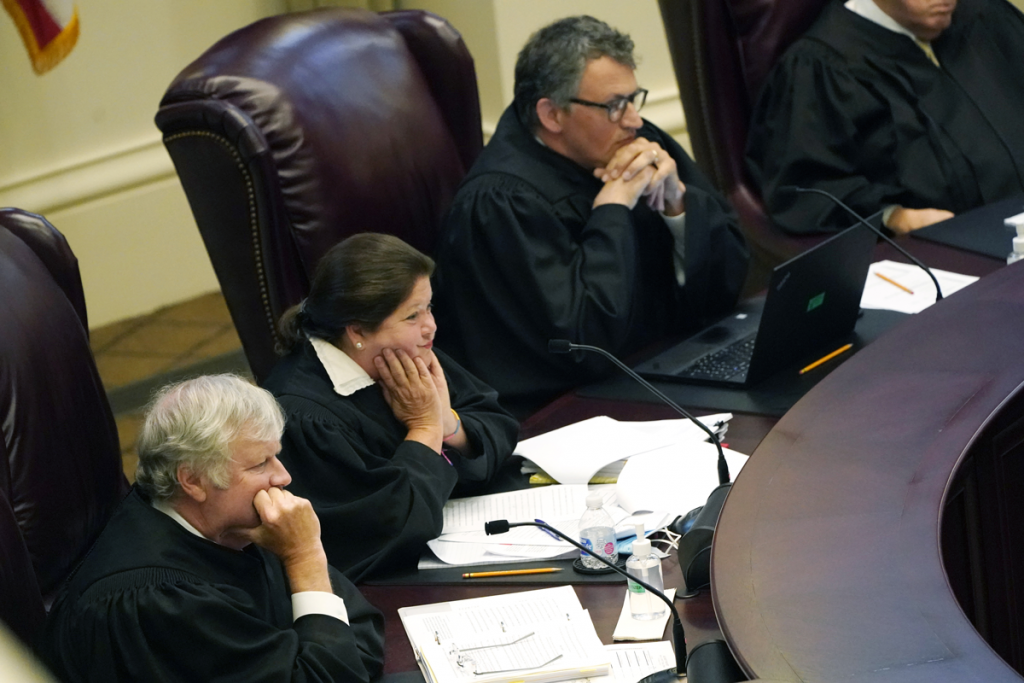The Mississippi Supreme Court today killed the medical-marijuana program that 68% of Mississippi voters approved in 2020, and with it, the state’s entire ballot-initiative process. The ruling means that voter-driven efforts to adopt early voting and expand Medicaid in the state are also now dead.
Mississippi adopted the ballot-initiative process under Section 273 in the 1990s. The language of the law says that citizens collecting signatures to get an issue on the ballot must collect one-fifth of their signatures from each of the state’s five congressional districts. But because the state lost a congressional district after the 2000 Census, the Supreme Court says the process is now null and void.
Associate Justice Josiah D. Coleman, writing for the majority, opined that the Court was forced to follow the letter of the law. Coleman laid the blame for the inevitable collapse of the state’s popular initiative system squarely at the feet of the Legislature that drafted the ballot process, and then failed to update it.
“Now, more than 20 years after the Census that resulted in the problematic reduction on our congressional representation, after several ballot initiatives have been attempted both successfully and unsuccessfully, and after several unsuccessful attempts in the Legislature to address the problem, we find ourselves presented with the question squarely before us and nowhere to turn but to its answer,” Coleman wrote.
Justices Randolph, King, Beam, Ishee and Griffis concurred. Justices Maxwell, Chamberlain and Kitchens dissented.
Associate Justice James D. Maxwell II issued a sharp critique of the Court’s 6-3 decision in his dissent, asserting that stripping the ballot-initiative process overstepped the Court’s authority.
“The majority … (steps) completely outside of Mississippi law to employ an interpretation that not only amends but judicially kills Mississippi’s citizen initiative process. While the majority admits that our Constitution should not be ‘expanded or extended beyond its settled intent and meaning by any court,’ it actively injects a federal court’s injunction into our Constitution—an injunction that was in no shape, form, or fashion aimed at the initiative process,” Maxwell wrote. Chamberlin joined this dissent in part.
Coleman’s majority opinion firmly severs the constitutionality of any further ballot initiatives, including current planned initiatives like Medicaid expansion and early voting, both of which supporters hope to put to a popular vote in 2022.
It also calls into question popular initiatives passed after Mississippi lost its fifth congressional district in 2002, including voter ID requirements. Just as with Initiative 65, the Mississippi Supreme Court would need to hear challenges to these initiatives to throw them out, from petitioners that the Court gauges to have the proper standing necessary to challenge them.
“Because Initiative 65 was placed on the ballot without meeting the section 273(3) prerequisites for doing so, it was placed on the ballot in violation of the Mississippi Constitution,” the ruling says. “Whether with intent, by oversight, or for some other reason, the drafters of section 273(3) wrote a ballot-initiative process that cannot work in a world where Mississippi has fewer than five representatives in Congress. To work in today’s reality, it will need amending—something that lies beyond the power of the Supreme Court.”
Mississippi was one of three states in the U.S. that lost population in the 2020 Census, though it did not lose an additional district. Without adjustments to the state’s constitution, Mississippi would have to reverse its population loss and regain a fifth congressional district in 2030 to begin the process of certifying ballot initiatives once more.
The Court’s decision is a victory for Madison Mayor Mary Hawkins Butler, who challenged the initiative before last year’s election, arguing that Initiative 65 conflicted with the zoning authority of the City of Madison.
‘Blame That on the Legislature’
“This is why the MS Senate put forth the legislation it did this past session. Now there is no medical marijuana program,” Sen. Brice Wiggins, R-Pascagoula, tweeted this afternoon. “Now there is no citizen-led amendment process w/o #msleg action.”
Wiggins was a supporter of an alternative medical-marijuana program that would now be in the works after the judicial dismantling of Initiative 65. In an interview with the Mississippi Free Press, Wiggins explained that his support of the alternative proposal was intended to avoid this specific outcome.
“If people go back and review my comments and the debate on the Senate floor, we debated until after midnight. This is the exact scenario that we talked about,” Wiggins said. “Everything that the bill’s supporters worked for is no longer in law. That’s why the Senate worked on the bill and added trigger language in case this happened.”
Wiggins said the Court’s strict interpretation of the letter of the law was not surprising. “When you’re dealing with the constitution, you’re dealing with the highest standard. We live in a republic,” he said.
Reporter Nick Judin asked Wiggins, with all the debate over an alternative marijuana initiative, why the Legislature had again failed to amend the ballot-initiative process to function with Mississippi’s current number of congressional districts.
“That’s the right question,” Wiggins said, acknowledging that the Legislature as a whole had failed to take action. “You can blame that on the Legislature. It was noted in the majority opinion that there were seven different (attempts) by individual legislators to make it current. Those all died in committee.”
Wiggins expressed his support for repairing the state’s broken ballot-initiative process in the 2022 legislative Session. “I think it’s obvious that if we as a state are going to have an initiative program, we’re going to have to (update) that.”
Asked if he would personally introduce legislation to reduce the needed congressional districts if other legislators did not, Wiggins noted that it would likely start with a legislator in the Constitution Committee, but said he would “consider” the prospect.
Wiggins also maintained his aversion to adopting the specific language of Initiative 65 in a 2022 legislative action. “The Senate made a good-faith effort this past session to create a well-run, well-respected, well-liked medical-marijuana program,” the senator said. “There’s problems in the initiative language that need to be looked at as well,” he said, pointing to zoning and taxation in particular.
Rep. Chris Bell, D-Jackson, castigated the Supreme Court’s decision in an interview with the Mississippi Free Press today, lamenting the loss of the ballot-initiative procedure, and the medical-marijuana program in particular.
“It’s unfortunate that you have a state Supreme Court that saw fit to disrespect the over 70% of Mississippians who voted on that ballot initiative for medical marijuana,” Bell said. “I’m almost lost for words. It’s disrespectful to the many people that medical marijuana could help. It’s disrespectful to the progress of this state. It disrespects humanity.”
“We had an opportunity to get people off pain pills, to get them off opioids,” Bell said. The Jackson legislator said the decision precluded promising new ballot measures that could have brought progressive change to the state.
“It kills the people’s opportunity to bring forth change through ballot initiatives. Early voting is down the drain. Medicaid expansion is gone. It’s disheartening,” Bell added.
Activists, Leaders React
Kelly Jacobs, one of the organizers who was working to get early voting on the ballot in 2022, expressed outrage when reporter Ashton Pittman told her about the decision when he called for comment this afternoon.
“Today, six judges decided to damage our Mississippi Constitution, silencing the rights of the people to rule together using an initiative process. I am furious that the court took an axe to our Constitution instead of a scalpel. Their ruling is shameful and disastrous,” Jacobs said.
Shea Dobson, the Republican mayor of Ocean Springs, said in a Facebook live video today that the ruling shows that the court believes the voices of Mississippi voters “don’t matter.”
“We will come back, and we will have a medical-marijuana process in Mississippi before this is all said and done. I promise you that,” said Dobson, who was among the supporters who helped launch the Medical Marijuana 2020 campaign almost three years ago.
“The Mississippi Supreme Court just overturned the will of the people of Mississippi,” said Ken Newburger, executive director of the Mississippi Medical Marijuana Association. “Patients will now continue the suffering that so many Mississippians voted to end. The Court ignored existing case law and prior decisions. Their reasoning ignores the intent of the constitution and takes away people’s constitutional right. It’s a sad day for Mississippi when the Supreme Court communicates to a vast majority of the voters that their vote doesn’t matter.”
Statewide leadership have thus far declined to provide extensive opinions on the Friday afternoon decision. Lt. Gov. Delbert Hosemann told Caleb Bedillion of the Northeast Daily Journal that “the Senate passed backstop legislation which we anticipate revisiting in January.” Just before press time, Hosemann provided the Mississippi Free Press with the same statement.
The Daily Journal also reported that Gov. Tate Reeves declined to comment on the Mississippi Supreme Court’s decision before proper “analysis” of the decision was completed.








